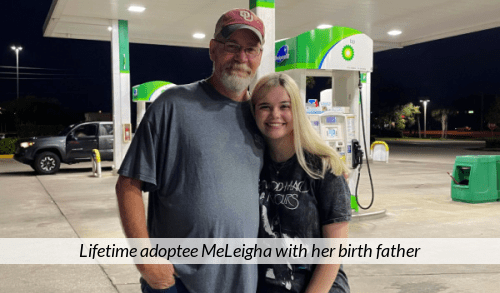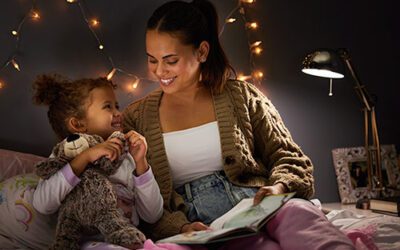
Since Lester and Redeetha maintained an open adoption with MeLeigha’s birth parents, she’d grown up having some contact with her birth family. However, she had never met them face to face. When MeLeigha saw her birth father, she recognized him immediately from the pictures she’d seen. At that moment, she decided to meet him.
This is a great testimony of how open adoption helps prepare your child for the future. As they grow up knowing where they came from and having a connection with their birth family, it prepares them to have a relationship with their birth family when they reach adulthood.
Open Adoption
A post adoption contact agreement gives the birth parents and adoptive family the chance to establish expectations as the child grows up. In an open adoption, the adopted child has contact with their birth family through letters, social media, emails, and sometimes visits. Most open adoptions specify that, at 18 years of age, the adopted child will choose if they want to have a relationship with their birth family.
When your adopted child enters adolescence, it’s crucial they have a say about their relationship with their birth family. Over the years, they probably had many questions about their birth family, and if you raised them with open adoption, many of their questions got answered. Still, at some point, they will want to start communicating with their birth family on their own. So it’s important that you support them during this transitional time in their life.
Shifting Roles
Once your adopted child reaches 18, they will make the decision about meeting their birth family. As young adults, they’re curious about their roots. Studies show that adoptees experience a shift in their relationships with their birth family and adoptive family once they reach adulthood.
Maintaining open communication with your child during this time is essential. Let them know you support them and are excited for them to learn about their birth family.
Encourage Communication
Keeping the lines of communication open with your child about their adoption will help them feel secure as they launch into this new world of learning about their birth family. Make it easy for them to talk to you about their birth family. Ask them questions, not to pry, but to gauge how they’re processing this experience. Your questions could be something like:
- How are you feeling about meeting your birth sister?
- What did you feel like when you met your birth father?
- Do you think you’ll want to meet other relatives?
- How has meeting some of your extended birth relatives helped you?
- What are some negative feelings that came out of meeting your birth family?
- How can I support you?
- Is there anything I can do to help you during this time of meeting your birth family?
Talking About Your Child’s Birth Family
Throughout the child’s life, adoptive parents in open adoptions maintain contact with their child’s birth family. Now that your child has become an adult, you can still keep your relationship with them. Here are suggestions to continue this positive connection.
Avoid saying negative things about the birth family. You don’t want your child to feel as if you don’t accept their birth family. But, of course, if your child could be in danger due to contact with their birth family, that is different.
Treat them as real people: Like you, your child’s birth family has strengths and weaknesses. They’re normal people, so treat them that way.
Respect them: Keep in mind this birth mother gave your child life. She chose YOU to raise her child, and she deserves your respect.
Remain connected: Keep a general connection with your child’s birth parents through Facebook or Instagram. Don’t overstep your child’s relationship, but be there if there’s a need for contact.
Setting Your Child Up for Success
As adoptive parents, you undoubtedly want the best for your child now and in the future. Maintaining an open adoption gives your growing child the chance to know their birth parents and why they chose adoption.
When your child hits adolescence, they will begin making decisions about how much contact they want to have with their birth parents. It’s a transitional time for you and your child. Offer them your love and support during this time, just like you did their entire life.
As Vice President of Lifetime Adoption, Heather Featherston holds an MBA and is passionate about working with those facing adoption, pregnancy, and parenting issues. Heather has conducted training for birth parent advocates, spoken to professional groups, and has appeared on television and radio to discuss the multiple aspects of adoption. She has provided one-on-one support to women and hopeful adoptive parents working through adoption decisions.
Since 2002, she has been helping pregnant women and others in crisis to learn more about adoption. Heather also trains and speaks nationwide to pregnancy clinics to effectively meet the needs of women who want to explore adoption for their child. Today, she continues to address the concerns women have about adoption and supports the needs of women who choose adoption for their child.
As a published author of the book Called to Adoption, Featherston loves to see God’s hand at work every day as she helps children and families come together through adoption.




Hello I read your article and it was very helpful! Thank you so much.
You’re welcome! Thank you for your feedback. We’re glad the article was beneficial for you.
I Gove a daughter up for adoption . It was an open adoption and I have communicated with them over the years. She recently turned 18 and I’d it appropriate for me to call her my daughter when talking about her to my family and friends. I know and respect her adoptive parents snd don’t want to step on any toes . She is my daughter though right ?
I would ask if the communication has been two-way with your daughter before now. Have you met in person? Have you spoken with her on the phone? If not, I would encourage you to reach out to her adoptive parents and share that you would like to speak with her by phone and get to know her a little more. See how they would feel and ask how they think your daughter would feel before picking up the phone to have a two-way conversation, especially if one has never taken place.
Expectations in open adoption after the adoptee turns 18 need to continue to be managed. For the birth mother, you may have an expectation of joyful reunion. Your daughter, at 18 years old and raised knowing she was adopted, may have mixed feelings, no feelings, or excited feelings about this new “adult” relationship. A better approach may be to share with the adoptive parents that you would welcome creating your own relationship with your daughter, now that she has turned 18. Provide them with your phone number and ask that they pass it along to your daughter.
I have heard from birth mothers who were very disappointed that their child was not interested in knowing more about them or having a close relationship. This can be normal with anyone, especially an 18-year-old. Young adults often want to get out and experience the world separate from adults, including their parents! If the phone call or relationship doesn’t happen right now, it doesn’t mean it never will. But a meaningful relationship begins with a desire by both parties to build a relationship. And if your daughter isn’t ready to do that just yet, it can lead to disappointment for you.
Of course she’s your daughter. She can be both of yours. God gave you her. And you shared her to them.
I adopted my son in 2018, he recently turned 18 and is seeking his adopted mom which is my cousin. It’s a very hard situation because we grew up very close, but she lost custody of all five of her children due to heavy drug use. It breaks me him seeking her as I know she is still using and has never been clean as she refuses treatment. I also saw her stealing from a local store. Should I allow him to see her since he is 18 or what should I do. Because I get angry and just want to cry
At some point, most adoptees will want to start communicating with their birth family on their own. So it’s important that you support him during this transitional time in his life.
Once your adopted child reaches 18, they are legally an adult and so they can make the decision about meeting their birth family. We encourage adoptive parents to avoid saying negative things about the birth family. You don’t want your child to feel as if you don’t accept their birth family. Treat them as real people: like you, your child’s birth family has strengths and weaknesses.
I read your articles love it.
My questions is my husband adopted my 2 older kids. In September 2020 and one my kids don’t get along with my husband my husband treats him Duffey he doesn’t my son to get near my other 2 kids that I had with husband which his little brother and sister because he said that his adoptive son is a bad example to my younger kids my husband treats him different since I married him 15 years ago my son try to get close to him my husband doesn’t show no love no affection now my son wants to reverse the adoption but he wants to see his tel dad but my husband doesn’t want to. What can I do?
It sounds like you have a complicated situation in your home. Finding an intermediary like a family therapist may be a good first step. It sounds like you and your husband could benefit from discussing your feelings about treating the children differently and then with your son about his desire to connect with his birth father. Wishing you the best as you work to find solutions for your family.
What would be an appropriate gift for a girl turning 18 who is adopted? it was an open adoption and I am the maternal grandmother.
A thoughtful, meaningful gift is always appreciated! If there is something she is particularly interested in or striving for is an encouraging gift at this age. For instance, if she is planning on college, funds toward helping her achieve her educational goals and a card sharing your faith in her. If that isn’t her, perhaps a small necklace with her birthstone celebrating her birth and meaning in your lives.